Showing 1-20 of 39 results
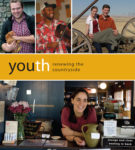
Youth Renewing the Countryside
Smart, young people are returning to the roots of American Agriculture-- roots steeped in a tradition and culture of diversity, quality and respect for the Earth. Full of brilliant color photographs, Youth Renewing the Countryside shares remarkable stories of young people in each state changing the world through rural renewal. Produced by Renewing the Countryside in […]
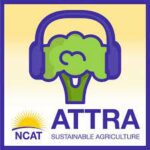
Growing New Markets for Specialty Crops
This episode of Voices from the Field is part of a series co-produced by ATTRA and SARE that explores the different ways farmers are working to create new local markets for specialty and niche crops. Each partner episode will address a different production system or crop–from endives to small-grain value chains–and will feature farmers sharing […]
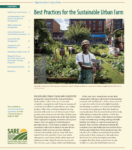
Best Practices for the Sustainable Urban Farm
For decades, urban farms and community gardens have helped meet the demand for fresh, local produce. Urban farms are diverse and adaptable, ranging from small farms on repurposed vacant lots to multilevel vertical farms and rooftop gardens. Often, they combine ecological farming practices with some form of infrastructure. Urban growers make clever use of their […]

The Peri-Urban Agriculture Network: Strategies for Agricultural Viability in Urbanizing and High-Land-Use-Pressure Regions
Many peri-urban regions in the western U.S. are in a state of acute juxtaposition between formerly rural agricultural communities and growing, modern urban centers. Urbanization challenges agricultural viability through land use pressures and a slow unraveling of historically land-based economies and culture. These agricultural circumstances can be very destabilizing and highlight the need for agriculture […]

Racial Equity in Extension webinar series
Recordings of six live webinars with panel discussions on topics geared toward a professional Extension or technical service provider audience in the U.S. (with focus on California). Topics range from 1) building relationships with farmworkers and farmers of color as Extension clientele, to 2) the world views and perspectives on sustainable agriculture of indigenous and […]

Grazing Networks for Livestock Producers
Grazing networks promote a mutual self-help approach to learning that is based on shared local experience and that provides several benefits to participants. This publication offers suggestions for finding or starting a grazing network and provides examples of the kinds of activities grazing networks might conduct. It also contains recommendations for sustaining a grazing network […]

Virginia Hosts National SARE Fellows Tour and Training
The sustainability of farms and food-related businesses can be affected by many agricultural, social, ecological, financial, and cultural factors and issues that can vary from state to state and from region to region. These issues range from market access and development needs to production challenges, lack of food system infrastructure such as aggregation and processing, […]
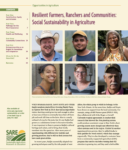
Resilient Farmers, Ranchers and Communities: Social Sustainability in Agriculture
When Nfamara Badjie, Dawn Hoyte and other family members started Ever-Growing Family Farm in Upstate New York in 2014, they had an improbable vision: that they could grow rice well enough to allow at least one of them to eventually leave their off-farm job and work full time on the farm. Rice is a nearly […]

The Value of Farming with Community
Shakera and Juan Raygoza talk about why their bonds with local consumers, families, schools, agricultural educators and other farmers are beneficial for both them and for the community where they live and farm. They operate Terra Preta Farm on 15 acres in Edinburg, Texas, where they grow organic radishes for wholesale markets and run a […]
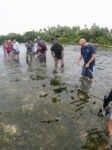
Understanding and Measuring Social Sustainability
This SARE brief defines social sustainability and illustrates how it can be addressed more clearly in SARE projects. Sample projects and quality of life indicators are provided to help grant-seekers and reviewers think broadly about understanding, measuring and describing the social impacts of research and education projects.

Building a Local Food Movement
Over the last few decades, agriculture in western North Carolina has transformed from a reliance on tobacco to a diversified, self-sustaining industry intertwined with local communities and economies. In this video, learn how one organization has worked alongside local farmers and communities to support this transformation.
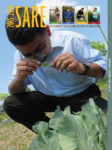
2015/2016 Report from the Field
Read about SARE-funded work in the areas of sustainable dairy cropping systems, soil health assessments, nutrient management, cover crops, beginning farmers, pollinators, technical assistance programs for women farmers, and more. This edition includes highlights of projects funded through the graduate student program, and the highly regarded Sustainable Agriculture Fellowship, a professional development program coordinated by SARE and NACAA.
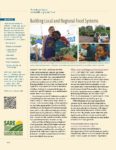
Farm to Table: Building Local and Regional Food Systems
More and more, farmers, ranchers, ag professionals, community organizers and others are striving to reconfigure the nation's food system so more value stays in food-producing communities.

The Small Ruminant Toolbox
This Small Ruminant Toolbox is a large collection of publications, presentations and other resources that will be helpful to small ruminant producers and educators.
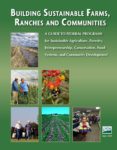
Building Sustainable Farms, Ranches and Communities
This guide lists funding opportunities offered by federal programs, and is indispensable for anyone seeking government help to foster their innovative enterprise in forestry and agriculture.

Good Natured Family Farms Brings Together Producers and Local Businesses to Market Local Foods
Good Natured Family Farms is an alliance of more than 150 family farms and small businesses in the Kansas City, MO area. They sell products under the Good Natured Family Farms’ logo in Balls Food Stores in the Kansas City Area. Their selection of products encompasses all-natural beef, free-range chickens, free-range brown eggs, farmhouse cheeses, milk, eggnog, […]
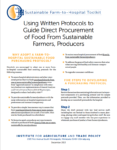
Farm to Hospital Toolkit
Tools farmers and hospitals can use to increase direct hospital purchases from local producers.
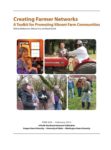
Creating Farmer Networks: A Toolkit for Promoting Vibrant Farm Communities
This toolkit provides information and resources needed to create a successful farmer network. It is intended for farmers, extension agents, community organizers, and other agricultural professionals.
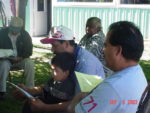
Biofuels and Community Participation
Extension and other natural resource educators can provide educational programming on renewable energy and potential impacts at the community level, and can be facilitators of community discussions about renewable energy. Sharon Lezberg provided training materials to approximately 100 extension, NRCS educators, and community stakeholders on ways to engage community members and stakeholders in assessing proposed bioenergy developments. The toolkit Lezburg developed provides a decision-making […]
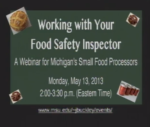
Working With Your Food Safety Inspector
How food safety inspectors and small scale processors can work together to meet regulations.